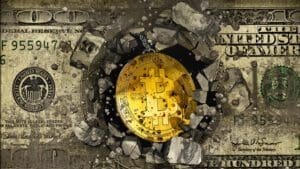 Bitcoin has made an absolutely remarkable run over the last decade. It may have gone up higher and faster than any other asset class, ever. It was trading under $5000 at the onset of the 2020 covid lockdowns, before running over $60,000 less than a year later. Today, I’d like to talk about why you might want to care from a perspective you may not have considered.
Bitcoin has made an absolutely remarkable run over the last decade. It may have gone up higher and faster than any other asset class, ever. It was trading under $5000 at the onset of the 2020 covid lockdowns, before running over $60,000 less than a year later. Today, I’d like to talk about why you might want to care from a perspective you may not have considered.
We’ve all heard the term, absolute power corrupts absolutely. It doesn’t take long before a governments power to print money out of thin air to pay for anything becomes abusive. Eventually, that leads to higher inflation, or a reduced value of the dollar in your bank account. Inflation is the hidden tax, largely coming from government and central bank actions. Ideally, as a citizen of this earth, you would like to be able to shield yourself from these abusive tendencies of governments.
Typically, the asset class used to protect you from this was gold. The history of governments abusing their power has tended to always end with going back to the gold standard. We abandoned the gold standard entirely in 1973.
During the great financial crisis, a mysterious person named Santoshi Nakamoto invented a peer-to-peer electronic cash payment system, called cryptocurrency, using what is called the blockchain. The blockchain secures these transactions on a decentralized platform. Meaning it is a publicly available, transparent network, free from rampant issuance of that currency from a sovereign nation. It was created to fight the Federal Reserve’s abusive ability to depreciate the currency in your pocket, and hopefully serve as a store of value. In essence, it is digital gold.
Bitcoin has done a remarkable job of serving as a store of value with it rising over 1000% in response to the central banks and government stimulus from the coronavirus. We are all seeing the inflationary effects of that now.
There are two recent main events that compelled me to write about cryptocurrencies. Governments are taking more authoritative measures lately. Prime Minister of Canada, Justin Trudeau is freezing bank assets of protestors of the trucker’s movement in Canada. Even more recently, the U.S. Treasury Department froze Russia’s currency reserves held by our banks.
I’m not here to debate these actions, other than to say it is a dangerous new slope to consider for everyone. If you are seen as an enemy of the state, they may freeze your bank accounts. The battle between government and users of cryptocurrencies is only just begun. President Biden just this week is expected to sign an executive order as a first step towards regulating digital currencies.
The point of this article is to not discuss if you should be investing in cryptocurrencies, but to highlight the debate and battle over what could be seen as people’s ability to “opt out” of money that is controlled by sovereign governments who tend to abuse their power. There are hidden tax ramifications by governments’ abusing their own currency, and now the control of your assets directly, should you be deemed an enemy. Something worth pondering, in my opinion.
If you would like to discuss this in more detail and the possible investment ramifications, please don’t hesitate to email me at ajpickert@stewcap.com
